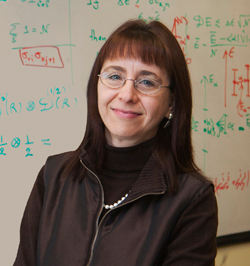Physicists from Dartmouth College have reported their work on an exotic particle called Majorana in a paper published in the Physical Review Letters journal.
 Dartmouth Professor Lorenza Viola is on the track of an exotic, subatomic particle, whose existence was first predicted 75 years ago. (photo by Joseph Mehling '69)
Dartmouth Professor Lorenza Viola is on the track of an exotic, subatomic particle, whose existence was first predicted 75 years ago. (photo by Joseph Mehling '69)
Majorana is an enigmatic particle that may be present on the frontier of matter and antimatter. It is also believed that the particle is both a matter as well as its own corresponding antimatter. Researchers also propose that Majorana particles consist of the mysterious ‘dark matter’ believed to create over 70% of the visible universe. However, they were not able to find any basic particle that is believed to be a Majorana particle.
Nevertheless, in the past few years, condensed-matter physicists have recognized that Majorana may jointly form as ‘quasiparticles’ consisting of ordinary electrons in matter, in suitable physical conditions. Scientists believe that these Majorana quasiparticles can be utilized as building blocks for quantum computers.
Exploration of the Majorana particles is very complex because particles and quasiparticles are active at the subatomic level in the region of quantum mechanics where classical physics rules cannot be applied.
Lorenza Viola, a theorist and professor of physics at Dartmouth College, together with Shusa Deng, a Dartmouth postdoctoral research associate, and Gerardo Ortiz, a professor of physics at Indiana University, has released a paper proposing a locale where the Majorana particles may be present. The researchers have put forward a hypothetical model to support the formation of topological superconductors, a type of exotic materials, by these Majorana quasiparticles.
Viola explained that the topological superconductors demonstrate a ‘split personality’ as their outer surfaces demonstrate an electrical conductivity just as metals, but their interior behaves like superconductors. The Dartmouth team proposes that Majoranas must happen only over the surface or over the interior-exterior interface. This hypothesis entails only traditional (s-wave) superconductivity in the bulk of the material without the presence of powerful magnetic fields, thus protecting the significant basic symmetry of ‘time reversal.’
Viola expects that rich insights can be derived from s-wave topological superconductors to study Majorana physics and determine topological quantum matter’s new basic properties.